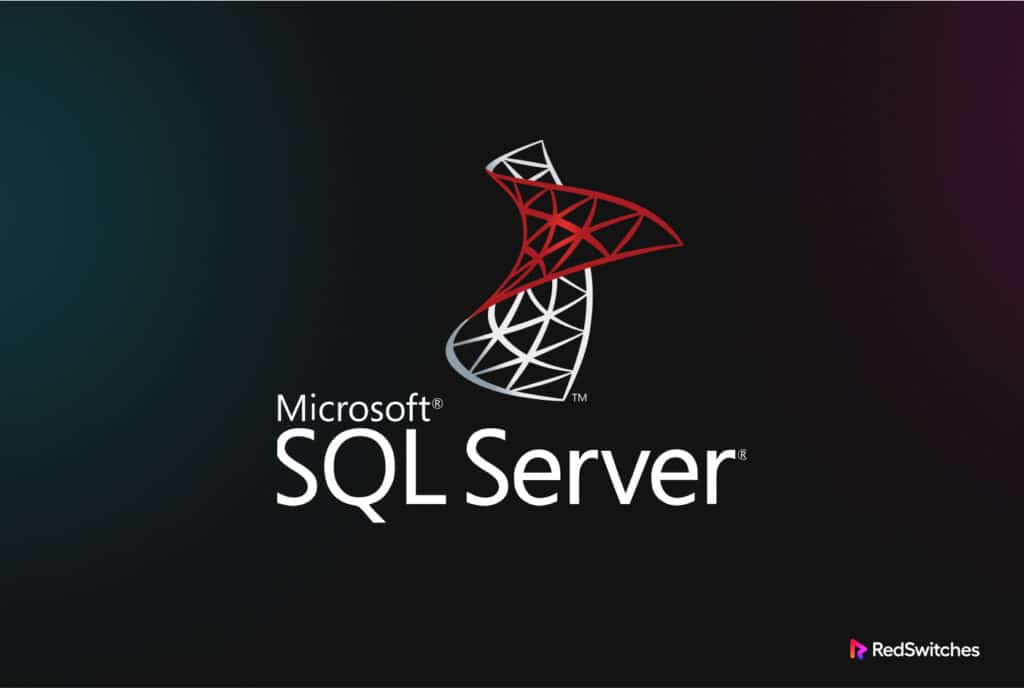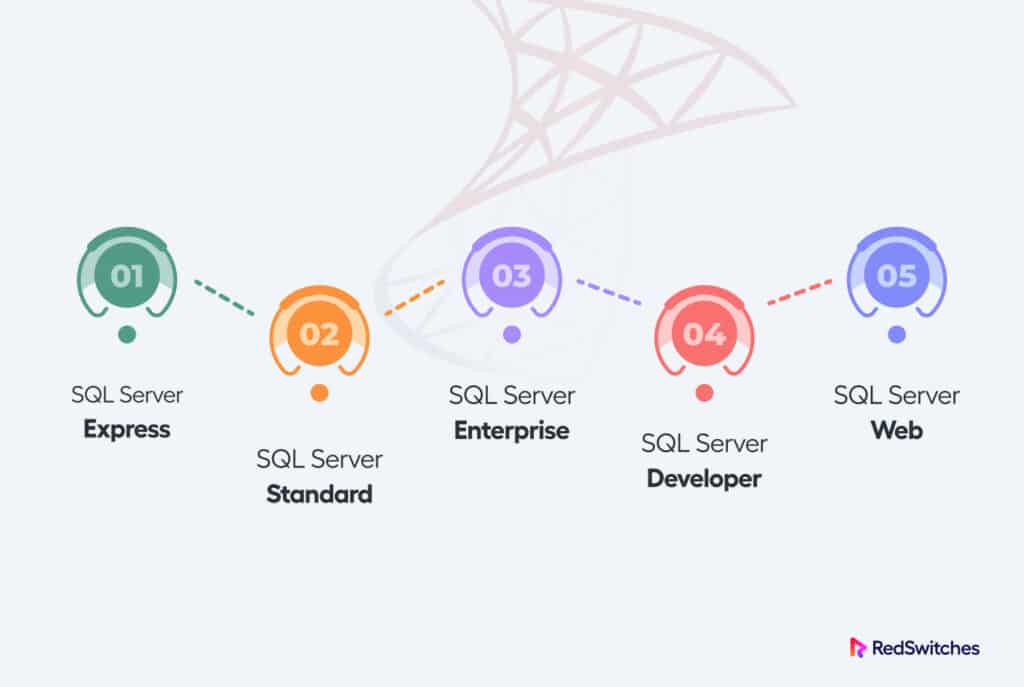Microsoft SQL Server is a robust and popular relational database management system (RDBMS), originally developed by Microsoft in 1989. Over the years, it has evolved into a crucial tool for companies of all sizes since it provides a strong foundation for data management, storage, and retrieval.
An important reason behind the popularity of SQL server is the availability of various editions tailored to the requirements of specific user groups. This allows users to take advantage of the capabilities of the RDBMS without getting bogged down by a huge feature set that mostly goes unused.
This in-depth article will explore the various Microsoft SQL Server editions and the history of SQL Server. We’ll round up with some tips to help you pick the right edition for your needs by doing the SQL Server edition comparison.
Let’s start with an overview of SQL Server and then briefly go into the history and key benefits of this popular RDBMS.
Table Of Content
- What is Microsoft SQL Server
- What is SQL Server Used for?
- SQL Server Editions: A Detailed Discussion
- SQL Server Edition Comparison
- Conclusion
- FAQs
What is Microsoft SQL Server?
Microsoft SQL Server is a database management system that manages storing, retrieving, and manipulating data.
It offers a safe and expandable platform for storing structured and unstructured data, allowing businesses to effectively manage their data and associated processes.
In addition to strong data storage, transaction management, high availability, data analysis, and reporting, SQL Server provides many other features and functionalities. It offers a complete collection of tools and services for database development, management, and business analytics.
And, since SQL Server adheres to the Structured Query Language (SQL) standard, you can further extend the SQL Server capabilities by integrating a wide range of tools and applications that are compatible with this standard.
Key Features and Benefits
SQL Server offers several key features and benefits, such as:
- Robust data storage and retrieval capabilities
- Advanced security features to protect data integrity and confidentiality
- Built-in scalability that can handle large datasets and high-performance requirements
- Built-in business intelligence and reporting tools
- Easy integration with other Microsoft products and technologies
A Brief History of SQL Server Versions
Over the years, Microsoft has released several versions of SQL Server, each introducing new features and improvements. The version lineup includes SQL Server 2000, 2005, 2008, 2012, 2014, 2016, 2017, 2019, and the latest release, SQL Server 2022. Each version brings enhancements in performance, scalability, security, and functionality.
What is SQL Server Used for?
SQL Server has a wide range of applications across various industries and sectors, including data management, application data support, and BI & analytics.
Let’s discuss these use cases in a bit more detail:
Data Storage and Management
In an organization, the SQL Server serves as a central repository for storing and managing structured data. It facilitates effective data organization, retrieval, and manipulation, ensuring data integrity and consistency. Organizations can use SQL Server to store and manage important business data like customer information, inventory records, financial data, etc.
Business Intelligence and Reporting
SQL Server offers powerful business intelligence (BI) capabilities, including data analysis, data mining, and reporting.
It provides resources like SQL Server Analysis Services (SSAS) and SQL Server Reporting Services (SSRS), which enable businesses to analyze their data, produce interactive reports, and make business decisions based on available data.
Application Development and Deployment
Building and deploying database-driven applications is made easier by SQL Server’s seamless integration with development tools and frameworks.
It supports a number of programming frameworks and languages, including .NET, Java, Python, and PHP. As a result, Developers can take advantage of SQL Server’s features to build dependable, scalable applications that effectively communicate with the database.
Integration with Other Technologies
Perhaps the best reason to opt for SQL Server is the seamless integration with other Microsoft products like Power BI, Excel, SharePoint, and Azure cloud services.
This support for integration allows data to be shared, teams to work together more efficiently, and procedures to be optimized.
SQL Server Editions: A Detailed Discussion
SQL Server offers different editions tailored to specific use cases and requirements. Let’s explore the main editions for a detailed SQL Server edition comparison:
SQL Server Express
Server Express is a free, entry-level edition of SQL Server.
It is appropriate for small-scale applications, development, and educational objectives. Despite some restrictions, it offers extensive capabilities for efficient data management, such as a 10 GB limit on the database size.
SQL Server Express is an excellent option for developers and small organizations with basic database requirements.
SQL Server Standard
SQL Server Standard is a mid-level edition that’s aimed at small to medium-sized businesses.
It offers a range of capabilities, including data warehousing, powerful analytics, and reporting capabilities.
SQL Server Standard provides features like Transparent Data Encryption and Always Availability Groups to enhance data security and high availability. It is a cost-effective choice for businesses that need strong data administration and analytical skills.
SQL Server Enterprise
SQL Server Enterprise is the most expensive version of SQL Server. It provides cutting-edge functionality and scalability for massive enterprise applications.
You get high-performance analytics, integration with popular Big Data solutions, and access to a full suite of business intelligence capabilities.
This edition also offers cutting-edge features such as in-memory OLTP, PolyBase, and support for integrating machine learning algorithms.
As a result, it is often the recommended edition for businesses with heavy workloads and complex data processing needs.
SQL Server Developer
SQL Server Developer edition is identical to the Enterprise edition in most features and capabilities.
However, the major difference is that it is licensed for development and testing purposes only. Developers can use this edition to build and test applications without additional licensing costs.
In addition, SQL Server Developer edition provides a complete set of tools and functionalities, making it an ideal choice for application development and testing environments.
SQL Server Web
The SQL Server Web version was created especially for hosting and web-based applications.
It offers support for Always Encrypted, JSON and XML compatibility, and enhanced security measures.
Because the licensing for SQL Server Web edition is based on the number of cores used by the hosting environment, it is affordable for businesses that need a database solution for web applications.
Now that you have a clear understanding of the various SQL Server editions, let’s discuss how you can pick the most appropriate version for your requirements.
SQL Server Edition Comparison: Listing out the Edition Features
An important aspect of understanding the various editions is to understand the differences between the SQL Server editions, to better understand the key features and limitations:
SQL Server Express
- Free edition with a maximum database size limit of 10 GB.
- Suitable for small-scale applications and development purposes.
- Limited to a single processor and 1 GB of RAM.
- Does not include advanced features like high availability and data encryption.
- Ideal for developers and small businesses with basic database requirements.
SQL Server Standard
- Supports l
- Offers advanced features such as Transparent Data Encryption and Always Availability Groups.
- arger databases with no size limitations.
- Compared to SQL Server Express, SQL Server Standard provides enhanced performance and scalability-focused options.
- Suitable for small to medium-sized organizations with moderate database needs.
SQL Server Enterprise
- Offers the highest level of performance, scalability, and advanced features.
- Supports features like PolyBase, Machine Learning algorithm integration, and in-memory OLTP.
- Designed for large-scale enterprises with demanding workloads and complex data processing requirements.
- Higher cost due to its extensive capabilities.
SQL Server Developer
- Offers a similar feature set as the SQL Server Enterprise edition.
- Licensed for development and testing purposes only.
- Ideal for developers and development teams that need a robust RDBMS to build and test applications without additional licensing costs.
SQL Server Web
- Specifically designed for web-based applications and hosting scenarios.
- Provides features like JSON and XML support and Always Encrypted format.
- Licensing is based on the number of cores used by the hosting environment.
- Cost-effective option for organizations hosting web applications.
SQL Server Edition Comparison: How Do I Choose the Right Version of Microsoft SQL Server?
Choosing the right edition of SQL Server depends on several factors. The following factors will help you make a comprehensive SQL Server edition comparison when selecting the appropriate edition:
Size of Your Organization and Number of Users
The size of your organization and the number of users who will access the database play a crucial role in determining the appropriate SQL Server edition.
Larger organizations with a high volume of concurrent users and complex data processing requirements may benefit from the Enterprise edition.
In comparison, smaller organizations can opt for the Standard or Express editions.
Performance and Scalability Requirements
Evaluate your performance and scalability needs when selecting a SQL Server edition.
If you anticipate handling significant data loads and require advanced scalability features, the Enterprise edition might be the best choice. For smaller workloads, the Standard or Express editions may suffice.
Features and Capabilities Required
Consider the specific features and capabilities your applications and business processes need for sustained functionality.
If you require advanced analytics, data warehousing, or integration with big data solutions, the Enterprise edition offers comprehensive functionalities. On the other hand, the Standard or Express editions may be suitable for basic data management and reporting needs.
Budget and Licensing Requirements
Budget constraints and licensing considerations are essential factors in the decision-making process.
SQL Server Express is free, making it an attractive option for small-scale applications. The Standard and Enterprise editions require licensing, and come with restrictions around the number of active users and deployment scenarios.
Conclusion
Microsoft SQL Server is a powerful and versatile relational database management system that caters to the diverse needs of organizations. Understanding the history, applications, editions, and factors involved in choosing the right version of SQL Server is crucial for making an informed decision. Consider the size of your organization, performance requirements, desired features, budget, and licensing considerations when selecting the appropriate SQL Server edition.
By aligning your requirements with the capabilities of different editions, you can optimize your data management and analysis processes, enhance application development, and ensure scalability and security for your organization’s databases.
FAQs
Q1. What is the difference between SQL Server Standard and SQL Server Enterprise?
A1. SQL Server Enterprise has more advanced features and scalability capabilities compared to SQL Server Standard. It is designed for large organizations with high-performance requirements.
Q2. Can I upgrade from SQL Server Express to SQL Server Standard?
A2. Yes, you can upgrade from SQL Server Express to SQL Server Standard. However, you may need to purchase a license and follow the upgrade process.
Q3. Can I use SQL Server Express for production purposes?
A3. Yes, you can use SQL Server Express for production purposes. However, remember that it has limitations, such as the maximum database size of 10 GB.
Q4. How often does Microsoft release new versions of SQL Server?
A4. Microsoft typically releases new versions of SQL Server every few years, introducing new features, enhancements, and security updates to meet evolving industry needs.
Q5. Does SQL Server support integration with other data sources?
A5. Yes, SQL Server supports integration with various data sources, including other databases, cloud platforms, and external systems, enabling seamless data integration and data-driven decision-making.


